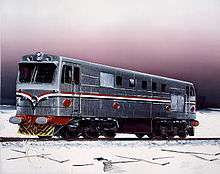Dirk Skreber

Dirk Skreber, (b. 1961 Lübeck, Germany) is a contemporary artist[1] who lives and works in New York City. He studied at the Kunstakademie Düsseldorf[2] and is considered one of the leading contemporary German artists.[3]
Work
Skreber's epic paintings embrace catastrophe, offering a religious awe of their grim expectation. Depicted with high-gloss allusion to media imagery and viewed through the odd angles of a surveillance camera, Skreber's works are meditations of death and isolation, rendered more intimate and appealing through the astringent sheen of consumerism.
Working in sculpture, installation and painting, Skreber's ranges from the abstract to the representational, though his work is concerned with the architecture of the hyperreal: highly articulated constructions which reside in suspended space and time. His subject matter draws from the mundane flow of contemporary life: buildings, car crashes and natural disasters are treated with the most clinical formalism. His work offers the detached seduction of the sublime.
Often working in epic scale, Dirk Skreber's paintings monumentalise the banal. Figurative scenes of lone train carriages and road accidents aren’t tableaux of narrative spectacles, but abstract incidents of incomprehensible beauty and horror. Rendered perfect in their making, their surfaces are impenetrable, exacting and serene; they don’t offer spatial illusion, but vast fields of emptiness. Skreber does not strive for photorealism; his work only borrows from the tropes of mechanical reproduction. The soft focus of advertising, aerial views of surveillance photography and image replication of print media are placebos of intimacy. Translated into painting, these devices serve as filters transforming the familiar into the uncanny.
Dirk Skreber uses the paint itself as a language of contradiction. Varying stylistically from seamless gradients to gestural rendering, his paintings don’t offer pictorial illusion, but instead, exploit their own material qualities. Photography captures a single moment in time; Skreber's paintings are frozen in expectation.
In his more abstract work, Skreber transfers the sublime contemplation of modernism into a more frightening contemporary construct, where personal psychology is replaced by the public realm. Dirk Skreber presents trepidation as a normalised condition of collective consciousness, awe as a symptom of mass-media proliferation, and spirituality as an achievement of design.
Exhibitions
Dirk Skreber has exhibited work at museums, institutions and galleries around the globe including, but not limited to, Kulturhuset (Stockholm), Andrea Rosen Gallery (New York), Museum für Moderne Kunst (Frankfurt), Centro de Arte Dos de Mayo (Madrid), Kunsthalle Düsseldorf (Düsseldorf), The Joslyn Art Museum (Omaha), White Cube (London), Staatliche Kunsthalle Baden-Baden (Baden-Baden) Denver Art Museum (Denver) and SkulpturenPark Köln (Köln).
His work is included in The Saatchi Collection, The Collection of the Museum of Contemporary Art (Los Angeles), The Collection of the Museum Frieder Burda (Baden-Baden) and many more. Skreber is currently represented by Friedrich Petzel Gallery (New York), Luis Campaña (Berlin)
Awards
- Preis der Nationalgalerie für junge Kunst, Hamburger Bahnhof, Berlin, 2000
References
- ↑ Petersen, Anne Ring; Bogh, Mikkel; Christensen, Hans Dam; Peter Nørgaard Larsen (2010). Contemporary painting in context. Museum Tusculanum Press. pp. 211–. ISBN 978-87-635-2597-8. Retrieved 28 September 2011.
- ↑ http://8c.4d.344a.static.theplanet.com/artistpages/skreber/biography.html%5B%5D Blum & Poe
- ↑ ART IN REVIEW; Dirk Skreber
External links
| Wikimedia Commons has media related to Dirk Skreber. |
- Dirk Skreber at Friedrich Petzel Gallery, New York
- Dirk Skreber at artcyclopedia.com
- Dirk-Skreber at the-artists.org
- Dirk Skreber at the Saatchi Gallery
- Dirk Skreber at the Frank Cohen Collection
- Dirk Skreber at It Rocks Us So Hard
- Dirk Skreber at artforum.com
- Art in Review at nytimes.com, reviewing Friedrich Petzel Gallery show